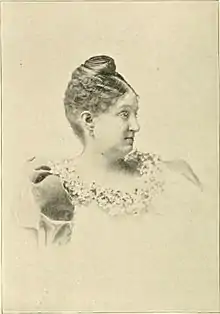Letitia Stevenson
Letitia Green Stevenson (January 8, 1843 – December 25, 1913) was the wife of Vice President Adlai E. Stevenson I, and thus second lady of the United States from 1893 to 1897.
Letitia Stevenson | |
|---|---|
 | |
| Second Lady of the United States | |
| In role March 4, 1893 – March 4, 1897 | |
| Vice President | Adlai Stevenson |
| Preceded by | Anna Morton |
| Succeeded by | Jennie Hobart |
| President General, National Society Daughters of the American Revolution | |
| In office 1893–1895 | |
| Preceded by | Mary Virginia Ellet Cabell (Vice President Presiding) |
| Succeeded by | Mary Parke McFerson Foster |
| President General, National Society Daughters of the American Revolution | |
| In office 1896–1898 | |
| Preceded by | Mary Parke McFerson Foster |
| Succeeded by | Mary Margaretta Fryer Manning |
| Personal details | |
| Born | Letitia Green January 8, 1843 Allegheny, Pennsylvania, U.S. |
| Died | December 25, 1913 (aged 70) Bloomington, Illinois, U.S. |
| Resting place | Evergreen Cemetery |
| Political party | Democratic |
| Spouse | Adlai Stevenson (1866–1913) |
| Children | 4, including Lewis |
| Parent(s) | Lewis W. Green Mary Peachy Fry |
Biography

Early life
Letitia Green was born on January 8, 1843. She was the daughter of Presbyterian Reverend Lewis W. Green (1806–1863), who was the head of Centre College in Danville, Kentucky, and Mary Peachy Fry, a descendant of surveyor and adventurer Joshua Fry. She was educated at the Walnut Hill Female Institute in Lexington, Kentucky, and a school near Gramercy Park in New York City. Upon the outbreak of the Civil War in 1861, she returned to Lexington. After her father died the next year, Green moved with her mother north to Chenoa, Illinois, where her sister, Julia Green Scott, lived. There, she met and courted Adlai Ewing Stevenson, a graduate of Centre College. The pair wed at Julia's house on December 22, 1866.[1]
The Stevensons moved into a house in nearby Bloomington in 1869, shortly after the birth of their first child, Lewis, so named for her father. They carefully planned their family in an era before this was common or publicly accepted. Letitia maintained the household in the frequent absence of her husband.[2] Daughter Mary, nicknamed "Bessie", was sickly as a child and eventually succumbed to tuberculosis in 1895. Lewis was also frequently hospitalized due to complications from an injury sustained while hunting. Stevenson traveled with her son to sanitariums across the region. Eventually, Stevenson's responsibilities waned as Lewis married and daughters Julia and Letitia left for boarding school. After a political appointment in 1884 led to a move to Washington, D.C., Stevenson became engrossed in the emerging women's rights movement.[3]
When Adlai was nominated for Vice President of the United States in 1892, Letitia campaigned on his behalf. Already used to public speaking through her leadership of Bloomington women's clubs, Stevenson spoke on her husband's behalf, especially in opposition to the Lodge Bill. She also typically wrote an acknowledgment letter to local media after campaigning in a city.[4]
Lewis Stevenson became the Illinois secretary of state and father of Illinois Governor and 1952 and 1956 Presidential candidate Adlai Stevenson. Their great-grandson, Adlai Ewing Stevenson III, was a U.S. senator from Illinois from 1970 to 1981 and an unsuccessful candidate for Governor of Illinois in 1982 and 1986.
She suffered from severe rheumatism and migraine headaches that often forced her to wear leg braces. Nonetheless, she was described as a "keen observer and judge of people, and a charming hostess"".[5] She helped establish the Daughters of the American Revolution to try to heal the divisions between North and South after the Civil War and succeeded Mrs. Caroline Harrison as President General.
Death
She died at home on Christmas Day aged 70 in 1913.[6]
References
- Baker 1997, pp. 102–103.
- Baker 1997, pp. 105–107.
- Baker 1997, pp. 111–112.
- Baker 1997, pp. 150–151.
- "VP Adlai Stevenson". 30 May 2014.
- "MRS. A.E. STEVENSON DIES.; Wife of ex-Vice President and ex-President General of D.A.R." (PDF). The New York Times. 1913-12-26. Retrieved 2009-02-19.
- Baker, Jean H. (1997). The Stevensons: A Biography of an American Family. New York: W. W. Norton & Company. ISBN 978-0393315981.
External links
- Letitia Green Stevenson Archived 2016-04-17 at the Wayback Machine—McLean County Museum of History